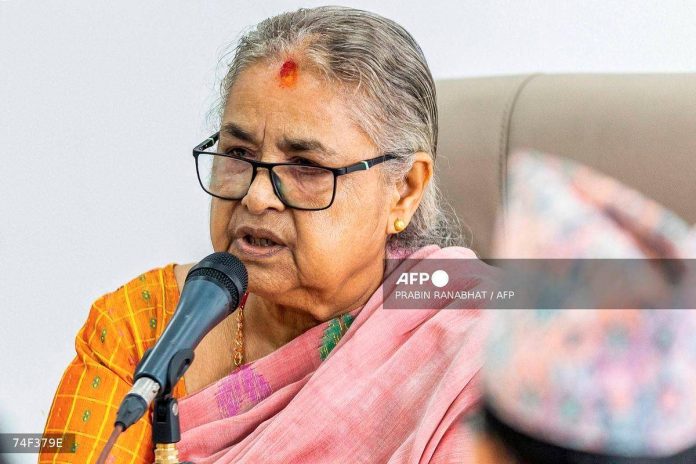KATHMANDU: After Nepal’s deadliest unrest in decades, caretaker Prime Minister Sushila Karki is working to forge her cabinet, restore order and prepare for elections within six months.
Karki, a 73-year-old former chief justice, faces the challenge of balancing her limited mandate with public pressure for reforms, especially on corruption and accountability.
Youth-led protests that began on September 8 over a brief social media ban, economic hardship and corruption quickly morphed into nationwide fury after a deadly crackdown.
Two days of violence left at least 73 people dead, with parliament and government buildings set ablaze — ultimately toppling the previous government.
Parliament was dissolved shortly after, and elections are set to be held in March next year.
Karki, who has named seven ministers so far, faces multiple challenges ahead.
Elections
The interim government’s core task is to hold credible polls on March 5, 2026.
Narayan Prasad Bhattarai, spokesman for the Election Commission told AFP there “might be challenges”, but insisted “six months is enough time”.
Deep public distrust in Nepal’s established parties and a changed political landscape will complicate the task.
“The 2026 elections will have huge stakes and bring with them the threat of political violence,“ wrote Ashish Pradhan of the International Crisis Group.
Pradhan told AFP that if the election timetable slips, people could feel “they have no recourse but to take to the streets again”.
Corruption
Youth anger over corruption fuelled the protests, with viral videos contrasting their hardship with the wealth of the ruling elite.
Nepal ranks 107 out of 180 on Transparency International’s corruption perceptions index.
Karki has said she is “determined” to tackle corruption, and has launched a hotline to report government bribery.
The World Bank says a “staggering” 82 percent of Nepal’s workforce is in informal employment, with GDP per capita at just $1,447 in 2024.
Every day, over 2,000 Nepalis leave the country to seek employment abroad, according to the International Labour Organization.
More than 56 percent of the 30 million people are aged under 30, and jobs for the young are hard to find.
Accountability
The government has formed a panel to probe protest violence.
Nirajan Thapaliya, from Amnesty International Nepal, said it must be an “impartial investigation”.
Some protesters were seen brandishing rifles on the second day of the unrest, with weapons allegedly seized from the police.
KP Sharma Oli, the ousted prime minster, has blamed “infiltrators” for inciting bloodshed and alleges the rifles came from another source.
Economy
The unrest battered Nepal’s fragile economy.
“Averting financial collapse — the state was already facing troubling economic headwinds prior to the protests — is sure to consume much of the interim government’s attention,“ Pradhan says.
The Federation of Nepalese Chambers of Commerce and Industry (FNCCI) estimates the private sector, including automobile, hotel and retail industries, endured losses worth $600 million.
The Hotel Association said more than 20 properties were damaged — including by arson and looting — estimating losses at $177 million, with more than 2,000 workers affected.
The country’s biggest supermarket chain, Bhat Bhateni, had more than 20 outlets attacked. Some were burned to the ground.
“If the government takes strong steps against corruption and shows commitment to good governance, it will help rebuild investment confidence,“ said Sujeev Shakya of the Nepal Economic Forum.
That would ease worries in the tourist industry, the country’s fourth largest employer.
Security
More than 13,500 prisoners escaped jail during the violence, and only half have returned.
Around 1,000 guns and ammunition were looted, The Kathamandu Post newspaper reported, citing police documents.
Re-establishing security while rebuilding trust in institutions will be among the most urgent tests for Karki’s government. – AFP







